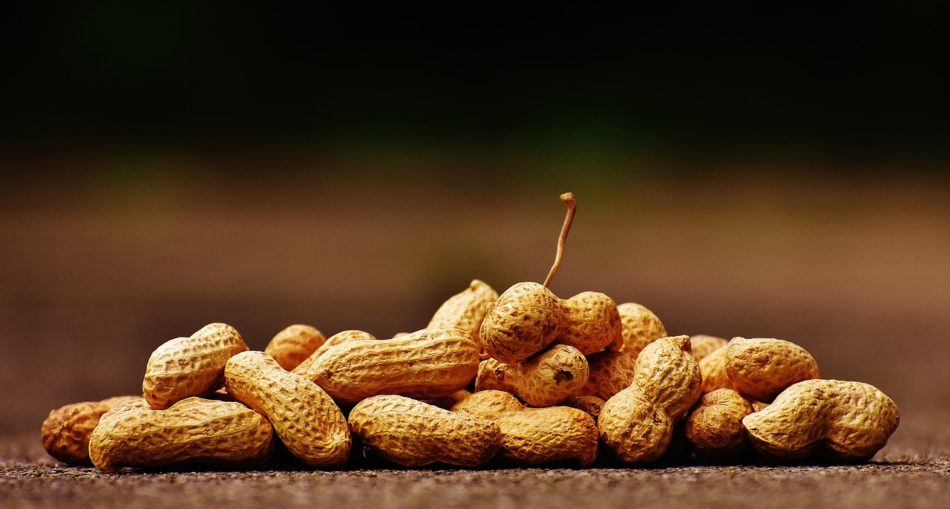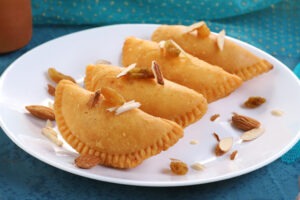Roasted or toasted, peanuts are another popular snack here in Guyana. Peanuts are commonly known as groundnut, earthnut in the Caribbean and pindar or goober around the world. The scientific name for peanuts is Arachis hypogaea. Peanuts grow best in sandy soil and will thrive in areas such as the Savannahs, Intermediate Savannahs, North West District, the Linden Highway, and the Upper Demerara and Upper Berbice Rivers in Guyana. Peanuts are not just a quick snack but a healthy one since they are packed with nutrients.
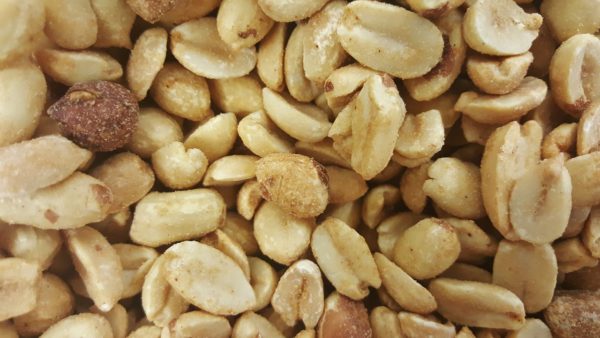
Peanuts – Image Source: https://www.needpix.com/photo/download/587169/peanuts-food-nutty-salted-peanuts-shelled-peanuts-nuts-salted-snack-tasty
Origins
This legume originated in South America, to be more specific, peanuts are believed to come from Brazil from where the Portuguese took it to West Africa. Peanuts were introduced to the Philippines by the Spaniards and from here they spread throughout tropical and sub-tropical Asia, and then on to the world. Some countries that produce peanuts include China, the United States of America, Nigeria, Guyana and Brazil.
Scientific Classification
- Kingdom: Plantae
- (unranked): Angiosperms
- (unranked): Eudicots
- (unranked): Rosids
- Order: Fabales
- Family: Fabaceae
- Subfamily: Faboideae
- Tribe: Dalbergieae
- Genus: Arachis
- Species: A. hypogaea
Interesting Tip
- Although it is called ‘peanut’ this is a legume.
- Peanuts grow underground.
- Although peanuts are a widely used snack, it may not suitable for everyone since it is a common cause of allergies.
Description
Arachis hypogaea or the peanut plant is an annual herbaceous plant that grows up to two (2) feet tall. This particular species, Arachis hypogaea has yellow flowers. They have small, thin and erect stems with leaves arranged in alternate pairs. After fertilization, elongated stalks grow downwards, carrying the budding ovary or peg into the soil. Once in the soil, the fruit begins to grow into the peanut pods which can contain up to six (6) seeds.
Nutrition Facts
Aside from the delicious crunchiness, peanuts are quite nutritious and are an excellent source of plant-based protein. Per one hundred gram (100g) of peanuts, there is 49 g 75% of Total Fat, 7 g 35% of Saturated fat, 16 g of Polyunsaturated fat and Monounsaturated fat 24 g. In addition, it contains 0 mg 0% of Cholesterol, 18 mg 0% of Sodium, 705 mg or 20% of Potassium, 16 g of Total Carbohydrate (5% ), 9 g of Dietary fibre ( 36%), 4 g of Sugar, 26 g of Protein ( 52% ), 9% of Calcium 25% of Iron, 15% of Vitamin B-6 and 42% of Magnesium.
Health Benefits of Eating Peanuts
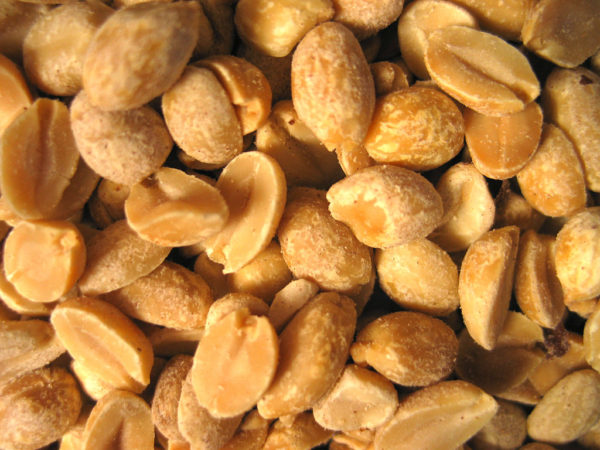
Salted peanuts – Photo by: Flyingdream at English Wikipedia [Public domain]
- Great source of Biotin – In the past biotin was known as Vitamin H. Biotin is a beneficial nutrient for your overall physiological well-being. This nutrient is involved in enzymes reaction in the body, which include processes regulating genes’ expression.
- Full of Healthy Fats – Peanuts have a similar profile to olive oil in respect to its 80% unsaturated fat and 20% saturated fat. These monounsaturated fats are associated with lowering cardiovascular risk. This is due to an artery-clearing process that keeps your blood flowing well thus lowering your risk of heart attack or stroke.
- Antioxidants – Peanuts, on a lesser-known scale, contains a powerful antioxidant like red wine, called resveratrol which is believed to improve blood flow, thereby decreasing the risk of stroke.
- Protection against Gallstones – Eating at least one serving of peanuts can reduce your risk of getting gallstones by at least twenty five (25) percent.
- Contains Copper – This essential micronutrient is needed for several physiological processes.
- Packed with Vitamins – Peanuts contains Vitamin B-complex groups of vitamins such as riboflavin, niacin, thiamin, pantothenic acid, vitamin B-6, and folates.
- Lowers Blood Sugar – The fibre in peanuts helps to lower blood sugar levels in the body.
Culinary Uses of Peanuts
- The peanuts or seeds are the main product of the plants. Peanuts are prepared in many different ways, for example, roasted or fried. They are a vital part of Mexican cuisine used to make ‘picante de cuy’, in South East Asia, they are made into a spicy curry and in a meat stew called ‘maafe’ in West Africa. In East Africa, they are used to make relishes and in the United States of America, peanuts are used in many candies, cookies and cakes.
- Peanuts are used to make peanut butter which was invented in Canada. These peanuts are ground into a smooth paste, known as peanut butter, however, there are different varieties.
- Peanut flour can be made from these legumes. suitable f0r vegans.
Other uses of Peanuts
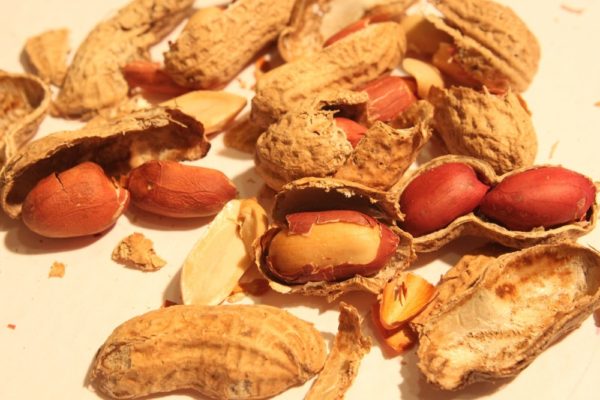
Peanuts – Image Source: https://www.needpix.com/photo/66206/broken-peanut-roasted-shell-skin-smashed-food
- From peanut oil, we can make paint, varnish, lubricating oil, leather dressings, furniture polish and even insecticides.
- Peanut shells are used in the manufacturing of plastic, wallboard, abrasives, glue, fuel, and cellulose for paper.
- Protein cakes or the oil residue from peanuts are used as livestock feed.
Interesting Tip
- George Carver came up with three hundred (300) ways to use the peanut plant, including many recipes and industrial uses.
Watch This – Salt Roasted Peanuts | CURRY BASKET
About Peanuts
Peanuts are a popular snack that can be roasted, chopped and sprinkled on desserts, added to dishes or even made into peanut butter. In Guyana, they are typically roasted and covered in sugar syrup. Regardless of how you prefer to eat this legume, you can be sure that you are benefiting from all of the healthy properties of this vitamin-packed ‘nut’ which includes providing antioxidants and adding to your physiological wellbeing. So the next time you’re out shopping, remember to add peanuts to your shopping list.
In case you missed it, read about a popular Guyanese snack made from peanuts: https://www.thingsguyana.com/did-you-know-that-nut-cakes-are-not-really-cakes/
Article References
- https://en.wikipedia.org/wiki/Peanut
- https://www.sciencedirect.com/topics/agricultural-and-biological-sciences/arachis-hypogaea
- https://plantvillage.psu.edu/topics/peanut-groundnut/infos
- https://www.nutrition-and-you.com/peanuts.html
- https://www.itac-professional.com/en/blog/peanuts-how-to-use-them-in-the-kitchen-and-the-food-industry/
- http://missourifamilies.org/features/nutritionarticles/nut487.htm
- https://www.stylecraze.com/articles/amazing-health-benefits-of-peanuts/#gref

